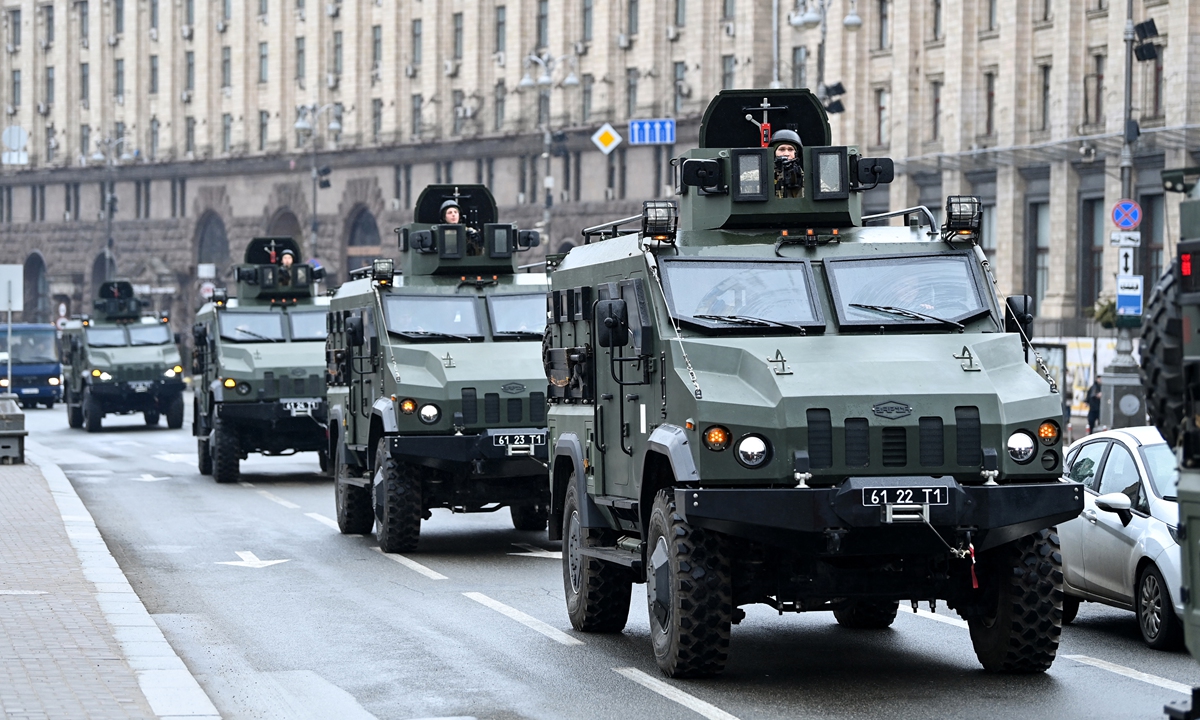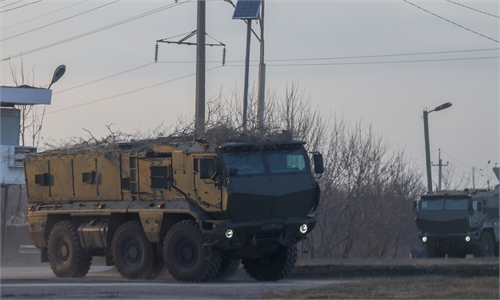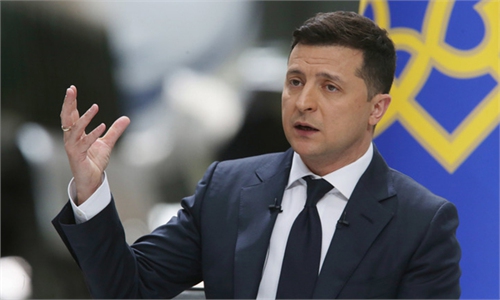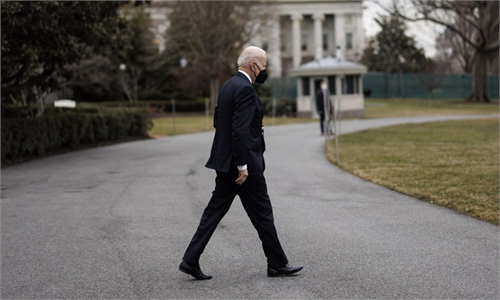
Ukrainian military vehicles move past Independence square in central Kyiv on February 24, 2022. Photo: AFP
Click here to stay tuned with our live updates on Ukraine tensions.
War in Ukraine has broken out. Russian President Vladimir Putin on Thursday gave approval to a "special military operation" in the Donbas region of Ukraine, and hereafter, the Russian military launched a devastating strike on the Ukraine airbases and defense forces. Reports on Russia's military operations keep emerging. The Ukrainian side claimed that Russian ground forces had crossed into Ukraine from several directions. But many information has not been officially confirmed by the Russian side.
Putin said Russia did not plan to occupy Ukraine and in view of the continuous eastward expansion of NATO and Russia's worsening security environment, Russia has no choice but to launch the military operations.
US President Joe Biden in a statement condemned that Russia had "chosen a premeditated war," saying "Russia alone is responsible for the death and destruction this attack will bring." Criticisms from US allies are rapidly converging.
Russia said it had neutralized Ukrainian military airbases and its air defense systems. But it's still unclear how far Russia's military operations will go and what its ultimate goal is.
In general, Putin's decision has gained extensive support from Russian society. There are three reasons. First, the continuous eastward expansion of NATO pushed by the US has squeezed Russia's strategic space and deeply humiliated this fighting nation. Putin drew his sword. He is creating a historical turning point to end Russia's forced retreat since the disintegration of the Soviet Union. The shells that fell on Ukraine are also Russia's spit in the face of Washington.
Second, Ukraine and Russia have lived together for more than 300 years, and their cultures have been integrated. However, Ukraine has turned against Russia in recent years and has fully tilted to the West, taking an anti-Russian path similar to that of the Baltic countries. This path is common in the countries of the former Soviet Union and Eastern Europe. Those countries are convinced that with the backing of the US, it is safe for them to be hostile to Russia. This has long irritated Russians. Therefore, they generally support Putin to use Ukraine as a warning to the rest of Eastern Europe.
Third, Russia has already gotten used to being sanctioned by the US and the West after so many years. It is even prepared for a worst-case scenario, where the US shuts down Russia's internet. With oil prices staying at a high level and sufficient foreign-exchange reserves, Russia now has the ability to resist sanctions. Therefore, Russians are not worried if sanctions will affect their life heavily.
In my opinion, Putin wants to push Kiev to promise that it won't seek to join NATO and fundamentally change its pro-US strategy. He wants Ukraine to become the shield protecting Russia from NATO's pressure. Once Ukraine changes its course, an alliance between it, Belarus, and Russia could change the geopolitical pattern in Eastern Europe through close cooperation.
But the Zelenskyy government is unlikely to make such changes. Zelenskyy announced the decision to rupture ties with Moscow on Thursday. He also tweeted that he has talked with US, German and British leaders, calling on them to stop Putin immediately. He called for an anti-Putin alliance and sanctions on Russia. The confrontation will definitely last for a period of time. The next game point will be which side - Russia or the US and the West - will affect Ukraine's situation in the future.
This is a very painful time for Europe. NATO's eastward expansion and criminating Russiahave become political correctness in the West. Meanwhile, Russia feels deeply threatened by the eastward expansion of NATO and thus will fight to the end. Electoral politics has prevented Ukraine from having a reasonable adjustment in its route to be neutral between Russia and the West. Before the stalemate is broken, there will probably be more losses and pain.
The US and the West have underestimated Russia's capacity to withstand sanctions. Moscow may have also underestimated the resilience of Ukraine's anti-Russia path that is backed by the West as well as the sustainability of the West's support. When all sides cannot compromise, further escalation of military operations cannot be ruled out. Just as it would be a political disaster for Washington if the US changes its attitude towards NATO's eastward expansion, if Putin launched military operations and withdrew troops while the Kiev line remained unchanged, it may be difficult for him to explain at home.
Therefore, how the situation will develop is highly uncertain. Fundamentally speaking, this is a strategic showdown between Russia and the US. Whether Ukraine's attitude changes or not depends on how hard efforts are made by Russia and the US.
This incident and war have given small countries an important lesson: when they are caught between major powers, they should try to avoid completely being inclined to one side and helping this side challenge the other. This is very dangerous. In the modern world, wars between major powers tend to be impossible, as they are unable to withstand wars between them. When a great power punishes the pawns of another major power, it is a very difficult decision for the latter to fulfill its promise to join the battle to defend its smaller ally. As a result, weak and small countries must maintain their strategic independence at least to a certain extent at all times. They cannot turn themselves into a mortal enemy of another great power that must be eliminated in order to please one great power.
The author is a commentator with the Global Times. opinion@globaltimes.com.cn




